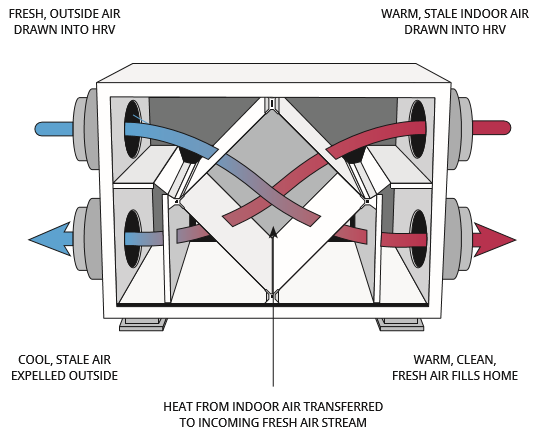HRV Explained for Families: Why It Matters
Checking out the Advantages of Heat Recovery Ventilation for Power Performance in Houses
Heat Recovery Ventilation (HRV) systems offer home owners a sensible method to enhancing energy efficiency. By recovering warmth from outward bound air, these systems can considerably minimize heating & cooling costs. Additionally, they supply a stable supply of fresh air, improving indoor air quality and convenience degrees. As house owners think about sustainable alternatives, comprehending the nuances of HRV systems becomes significantly essential. What aspects should one assess before making such a financial investment?
Recognizing Heat Recovery Ventilation Solutions

Exactly How HRV Improves Indoor Air Quality

Energy Financial Savings: The Financial Advantages of HRV
Optimizing power effectiveness, heat recovery ventilation (HRV) systems use considerable financial advantages for house owners. By recuperating and recycling warm from exhaust air, HRVs markedly lower cooling and heating expenses. This technology can lead to power financial savings of as much as 30%, depending upon environment and use patterns. Homeowners usually discover minimized energy expenses quickly after setup, making HRVs a monetarily sensible helpful hints financial investment in time. In addition, several regions offer rewards or refunds for energy-efficient upgrades, even more improving the monetary allure. As energy rates proceed to climb, the cost-effectiveness of HRVs comes to be progressively clear. Generally, the incorporation of HRV systems not only advertises energy efficiency but additionally adds to long-lasting financial savings for homes.
The Ecological Impact of Heat Recovery Ventilation
A significant ecological advantage of heat recovery ventilation (HRV) systems lies in their capacity to minimize overall energy usage. By redeeming heat from exhaust air and moving it to inbound fresh air, HRV systems lessen the requirement for energy-intensive home heating and cooling approaches. This decrease in energy demand adds to lower greenhouse gas discharges, as much less fossil fuel is needed to maintain comfortable indoor temperature levels. Additionally, HRV systems enhance indoor air quality by effectively exchanging stale air with fresh outdoor air, reducing reliance on mechanical air conditioning systems that can damage the setting. Generally, the execution of HRV systems sustains lasting living techniques and aligns with international initiatives to deal with environment change by promoting power performance in residential settings.
Picking the Right HRV System for Your Home
Just how can home owners ensure they select the right heat recovery ventilation (HRV) system for their needs? First, they must evaluate their home's dimension and design, as these elements influence airflow needs. Next, assessing the system's effectiveness ratings is important, as higher scores suggest much better performance and energy savings. Home owners must likewise take into consideration installment and maintenance prices, contrasting different brands and designs for value. Furthermore, it is essential to review sound degrees, as some systems run more quietly than others. Consulting with cooling and heating experts can supply customized referrals based on specific home problems. Checking out customer reviews and warranties can help in making an educated decision, making sure that the chosen HRV system successfully improves indoor air high quality and power performance.
Regularly Asked Inquiries

Exactly how Usually Should I Tidy or Keep My HRV System?
The regularity of cleansing or keeping a heat recuperation ventilation (HRV) system normally depends upon use and ecological aspects. Generally, it is a good idea to do upkeep every six months to assure try this website peak efficiency and air quality.

Can HRV Solutions Assist Decrease Humidity Degrees Inside?
HRV systems can successfully lower indoor humidity degrees by exchanging stagnant, damp air with fresh, drier air from outside. HRV use this link Heat Recovery Ventilation. This procedure assists keep a well balanced interior environment, improving comfort and stopping moisture-related issues
What Is the Lifespan of a Regular HRV System?
The lifespan of a normal heat recovery ventilation (HRV) system varies, typically lasting in between 10 to 15 years. Regular maintenance can extend its performance and functional life, guaranteeing peak efficiency throughout its use period.
Are There Any Type Of Sound Worry About HRV Equipments?
Sound issues with HRV systems can occur, especially from follower operation. Nevertheless, many modern devices are created to decrease audio levels, ensuring they run silently while maintaining effectiveness, which attends to potential disturbances in living environments.
Can I Mount an HRV System Myself, or Do I Required a Specialist?
The individual contemplated whether to mount the heat recovery ventilation (HRV) system directly or employ a specialist. Normally, while do it yourself installation is possible, know-how warranties proper functionality and compliance with neighborhood building ordinance, boosting system effectiveness.